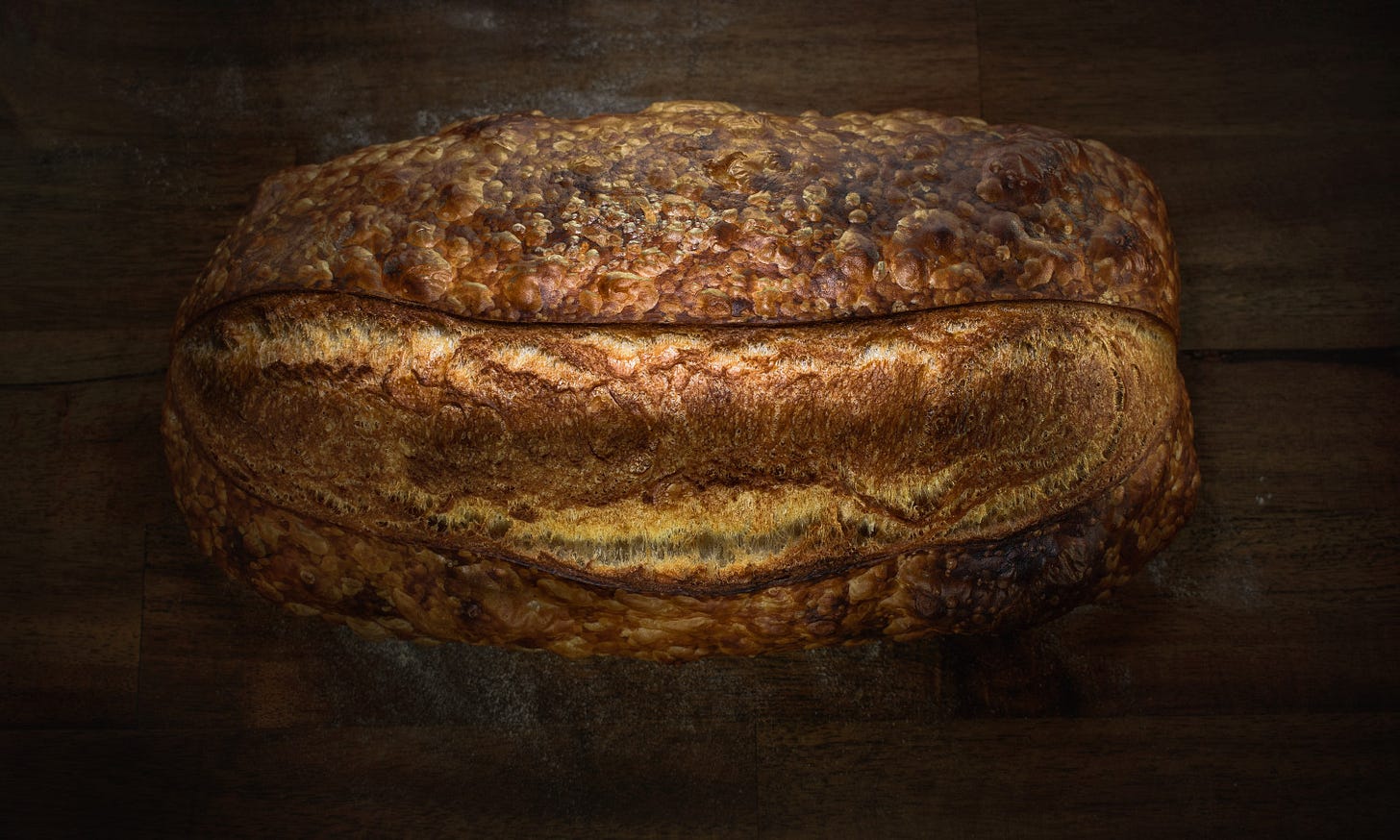On Bread & Society

Image: Shot
Sourdough is healthier than other bread.
Commercial bread has a similar amount of nutrients, but due to high levels of phytates —62% more than sourdough—that bind to them, they aren’t easily absorbed. And there is no point to nutrients if they can’t be used. Lactic acid neutralises them and increases their bioavailability.
Sourdough is also prebiotic. That means that it feeds the good bacteria in the gut. Commercial bread, on the other hand, isn’t very good for bacteria at all. Why? Well, preservatives exist to kill bacteria. They don’t care if it’s good or bad.
And then there is gluten—public enemy number one. The fermentation process sorts that out. It breaks down gluten making it far easier to digest. We only have one stomach after all.
All this and only from three ingredients: flour, water, and salt. Compared to commercial bread’s eleven (this is a picture from a common loaf I have at home), it’s quite the achievement.

Yet, commercial bread comes in way cheaper. Why? It has the same ingredients and more—one assumes that the other eight have price tags themselves—so how can it be cheaper?
The answer is time.
Sourdough takes time to make. In fact, by proportion, and employing a little imagination, time is the largest ingredient. By far.
It’s also the most important. Time is why lactic acid is produced and, in turn, why nutrients are accessible. Commercial bread has them artificially added. Time is why fermentation occurs and, in turn, why it’s digestible. Commercial bread is the reason that gluten is so hated. Time is the reason that sourdough is a prebiotic—bacteria and yeast need to flourish for bread to rise. Commercial bread uses instant yeast. And time is the reason that only three ingredients are needed.
We literally have to more than double the ingredients to reduce the manufacture time, in the process, we lose the good bits.
Essentially, the price of speed is substance.
But it’s not just bread. This same compromise happens over and over again. How often have you heard the phrase “they don’t make whatever like they used to”?
Just the other day I came across an entire thread of Kitchen Aid customers telling other Kitchen Aid customers not to buy the latest models. Rather they were sharing places to buy second-hand versions or places to repair them. One particularly vocal customer had even upgraded to a new one, used it a couple of times, and ended up pulling “old faithful” from storage.
Most telling was the evangelical pleas for bakers to use a second-hand model as opposed to buying new. Some with paragraphs of reasoning. This seems like an awful lot of effort going against what is meant to be an improved product.
If the reasons can be believed, cheaper, lower quality components are being used to drop costs and get more units out in a shorter period of time.
For me, most telling is how this manifests in the zeitgeist. Thinking itself is very much like sourdough; good ideas need to ferment. They need to be worked over and proofed. They need to rest. The outcome—a conclusion—is stronger when someone has mixed their ideas with time.
Conversely, we can substitute substance for cliche ideas. We can draw conclusions in record time. And often we do. We can patrol social media with a feverish hunger to defend ideas that we haven’t spent so much as an hour developing. We can manufacture opinions with ideas that are cheap imitations of the real thing. Rather than simple elegance, they are bloated with preservatives which result in a product that looks like the real thing, tastes okay, but lacks any sort of nutrition.
Bread is partly—if not wholly—responsible for the survival of man. Making bread allowed us to extract the nutrients that were embedded in grains without having to evolve a second or third stomach. In time, we managed to get through the impenetrable germ to the nutritious core. Yet, over time, we have resorted to sub standard loaves, over high-quality bread.
It’s no wonder our society is bloated, our ideas noxious, and our thinking stale. It’s time we rethink our recipe.
